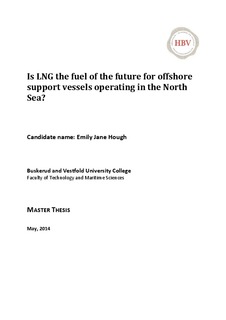Is LNG the fuel of the future for offshore support vessels operating in the North Sea?
Master thesis
Permanent lenke
http://hdl.handle.net/11250/302229Utgivelsesdato
2014Metadata
Vis full innførselSamlinger
Sammendrag
The first PSV to run on LNG as fuel was delivered to the North Sea in 2003 the offshore sector has since taken delivery of 12 with 4 more to be delivered in 2014 and 2015. The environmental benefits of LNG gas includes reduction of NOx and CO2, as well as close to complete reduction of SOx and particulate matters from exhaust emissions. A Norwegian fiscal tax on NOx emissions prompted the establishment of the Business Sector’s NOx fund that in exchange for a minimized tax on NOx, offered financial support to companies that implemented NOx reducing measures. For the Norwegian offshore sectore, this translated to a compensation of 80% of the additional costs relating to the building of an LNG fueled PSV compared to conventionally diesel driven. This qualitative study conducted semi-structured interviews with representatives from 4 different offshore companies currently operating with LNG fuelled PSVs to determine what the position towards LNG is today. The study showed offshore companies are no longer willing to build LNG vessels on a speculative basis. Incentive to build a LNG fueled vessel is now contingent on a long-term contract prior to building, where the charterer is willing to pay a premium as a result of higher building costs. The procurement method for newbuilding contracts of a major oil company operating on the Norwegian continental shelf is awarded on the basis of the technical and commercial superior ity with no preference to fuel and is so the basis of which and LNG vessel could potentially be built.
